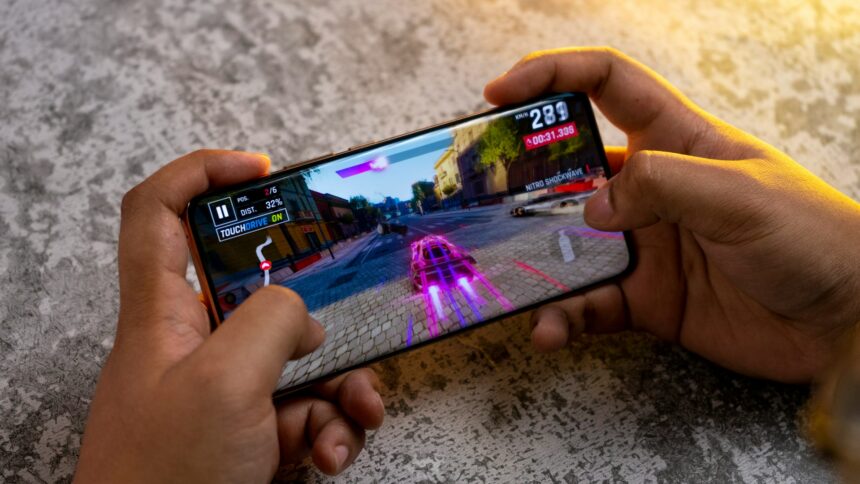You’re on the subway, waiting at the doctor’s office, or just trying to unwind in the evening: reaching for your smartphone has become second nature. Mobile games are often the go-to choice. What used to be a moment of staring into space is now a level in Candy Crush or a relaxing round of Monument Valley. But what does that do to the mind? Can mobile games truly help us unwind—or are they disguised stress machines? Just a few swipes separate pixel-perfect relaxation from aggressive sensory overload.
Mobile Games as a Stress Outlet: Why We Get Lost in Levels
In a world where stimuli are constant and overwhelming, many people look for quick, simple ways to relax. Mobile games offer exactly that: instant escape into another reality, anytime, anywhere.
Positive effects of mobile gaming on mental well-being:
- Instant Accessibility: No setup, no updates—just tap the screen and start.
- Reward Systems: Games like Alto’s Odyssey or Two Dots offer dopamine-driven success experiences.
- Focus Instead of Multitasking: Gaming usually involves concentrating on one task, which can have a meditative effect.
- Routine Building: Daily quests or level streaks can serve as structuring elements in one’s day.
A 2020 study from the Oxford Internet Institute found that moderate playtime with games like Animal Crossing was associated with increased subjective well-being. The popular game Monument Valley has even been described as “visual meditation”—gentle colors, slow motion, no time pressure.
When Mindfulness Becomes Compulsion: The Dark Side of Game Apps
As much as games can promote relaxation, they also carry risks—especially when they use addiction-based mechanics. Many seemingly calm games employ mechanisms aimed at maximizing engagement and consumption.
Critical aspects of modern mobile games:
- Endless Levels With No Natural Conclusion: Games like Candy Crush or Coin Master are designed around endless repetition, not resolution.
- Microtransactions and Pay-to-Win: Progress often depends on spending real money—leading to frustration and stress.
- Push Notifications: “You missed your bonus!” is less a call to relax than a digital nudge—or shove.
- Ads as Stimulus Sources: Many free-to-play games are ad platforms with game content in between.
This reveals a key insight: What starts as a relaxing break can quickly become emotionally draining—especially when gaming becomes a way to avoid deeper issues, leading to a problematic cycle.
Mindfulness via App: Is It Real?
Things get interesting when developers intentionally design games around mindfulness and mental health. Some mobile games are built specifically for relaxation and reflection.
Examples of mindful mobile games:
- “Viridi”: Care for a virtual plant in real time—no pressure, no objectives.
- “Prune”: A meditative game about growing and pruning a tree.
- “Florence”: An interactive story focused on emotion, relationships, and introspection.
These titles avoid high score pressure and instead encourage self-awareness.
Tip: To take more conscious control of your gaming habits, set a fixed budget for in-app purchases—e.g., use Google Play gift cards instead of linking direct payment methods. This creates distance and control.
Why Some Games Relax – and Others Agitate
Whether a game relaxes or stresses depends heavily on the individual player. The following factors shape the experience:
- Genre: Puzzle or simulation games tend to be calming, while action or PvP games are more activating.
- Play Duration: Short sessions of 5–15 minutes can provide meaningful breaks. Longer sessions often lead to fatigue.
- Game Objectives: Intrinsic motivation (e.g., curiosity, creativity) is healthier than extrinsic pressure (e.g., leaderboards).
- In-App Dynamics: Frustration from paywalls or excessive ads can quickly destroy a sense of control.
On Detox and Digital Balance: What You Can Do for Yourself
Mobile games are not inherently good or bad. What matters is how consciously they are used. Mindfulness doesn’t mean abstinence—it means reflective use.
Practical tips for healthy gaming habits:
- Set time limits—e.g., using app timers or daily quotas.
- Turn off push notifications to reduce external triggers.
- Choose games that don’t rely on pay-to-win mechanics.
- Reflect: Are you playing to unwind or to escape?
- Intentionally take breaks—don’t fill every idle moment with gaming.
Mindful Gaming: A New Cultural Form on the Horizon
The next generation of mobile games won’t just be smarter—they’ll be more empathetic. Developers are beginning to embrace the value of quiet, slowness, and emotional depth. Gaming platforms are starting to categorize games based on their mental impact. Mindfulness, once a niche concept from the yoga scene, may soon become a central design principle.
One insight remains: Mobile games are what you make of them. Those who choose consciously, play reflectively, and listen to their own needs can navigate between Zen and rage with just a few taps—and perhaps, in the process, come a little closer to themselves.










